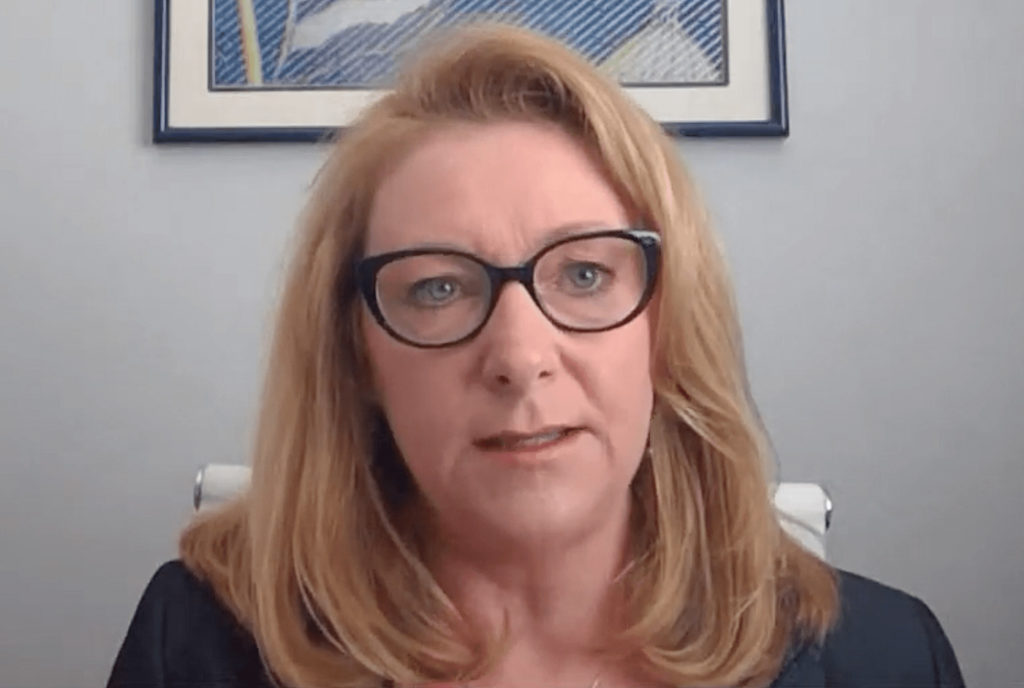
Congress should take “immediate steps” to get needed personal protective equipment to assisted living communities, nursing homes, home- and community-based settings and other places where older adults receive care, Dana Marie Kennedy, state director for AARP Arizona, told members of the House Ways and Means Health Subcommittee on Thursday. She was a hearing witness speaking on behalf of the national AARP organization.
“It is long past overdue to get needed protective gear into every facility,” Kennedy said in prepared remarks.
Although the hearing was titled “Examining the COVID-19 Nursing Home Crisis” and focused on nursing homes, witnesses also discussed senior living and other settings.
“Nursing homes and other long-term care facilities are ground zero in the fight against the coronavirus, representing a shockingly high share of deaths,” Kennedy said, also calling for immediate “ready access to testing” for residents and staff members. Regular testing should be required, she added.
“Testing will help control the spread of the virus among the residents, staff and the community at large, as staff and others come and go from these facilities,” Kennedy said.
Improved data collection and reporting efforts also are needed to assess the effects of COVID-19 across various populations, she said, noting that a growing body of research shows that Black and Hispanic individuals appear to be disproportionately affected by the pandemic, with higher rates of infection, serious illness and death.
“In order to address health disparities across the country, including those occurring within nursing homes and other long-term care facilities, it is important that the federal government gather data and publicly report on COVID-19 cases, deaths, co-morbidities and testing rates broken down into multiple demographic categories — while protecting patient privacy — including race, ethnicity, age, socioeconomic status, sexual orientation, gender identity, spoken/written language and disability,” Kennedy said. “Data should also include venues such as hospitals, nursing homes, assisted living facilities, residential homes and other locations.”
One thing AARP does not support, however, are government proposals under consideration that would grant COVID-19-related legal immunity to assisted living communities, nursing homes and other long-term care facilities, Kenndey said.
Similar needs, differing incomes
Hearing witness Nicole Howell, executive director of Ombudsman Services of Contra Costa, told committee members that assisted living and skilled nursing residents often have similar care and service needs.
“The only difference is some are able to pay privately, whereas others are not. Meaning, the social determinants of health outcomes, particularly income disparity, are more evident now than ever, and in this case, may be deadly,” she said.
Most assisted living residents pay directly for their care and services, whereas skilled nursing care primarily is paid for through Medicare and Medicaid, Howell said.
“Assisted living costs at least $5,000 per month, pricing many out of access and leaving our most vulnerable hard-working adults reliant on the Medicaid system as they age,” she said. “Forced to seek care and housing within a skilled nursing facility that was not designed to meet their long-term care needs, many Medicaid patients were placed directly in the path of COVID-19 and its deadly impacts.”
‘Far from over’
Kennedy and Howell were among seven witnesses at the hearing. Afterward, the American Health Care Association / National Center for Assisted Living President and CEO Mark Parkinson said the organizations appreciated the discussion about the disease’s disproportionate effect on long-term care.
“For nursing homes and assisted living communities, the COVID-19 pandemic is far from over,” he said in a statement. “Now more than ever, our residents and staff need ongoing prioritization and resources to prevent future outbreaks. We still lack reliable access to widespread testing, adequate personal protective equipment (PPE) and staffing support.”
Parkinson also called for funding from Congress.
“We are committed to working with members of Congress on solutions that will help us meet the needs of our residents and caregivers,” he said. “It is past time for policymakers and the public health sector to rally around long-term care facilities and give them the support they deserve.”
Argentum President and CEO James Balda also commented on the hearing afterward, noting that although the focus was on nursing homes, issues related to assisted living were raised in reference to COVID-19.
“Rep. Vern Buchanan (R-FL) called attention to the disparities in access to PPE between nursing homes and assisted living, and at Argentum, we have continually called on Congress and the administration to prioritize PPE and testing for senior living communities since the COVID-19 crisis began,” he said.
Committee members also raised concerns about staffing in communities, including the need for increased wages, a review of staffing ratios and improved benefits, Balda noted. “We continue to be supportive of proposals that would provide for ‘Hero Pay’ for all senior living workers, as passed under the HEROES Act by the House of Representatives in May and currently under consideration in the compromise legislative package,” he said.
The House subcommittee is accepting written comments for the record from individuals and organizations through July 9. Formatting requirements and additional information is available on the committee website.
Argentum information added June 26. Read additional coverage of the hearing from McKnight’s Long-Term Care News.



